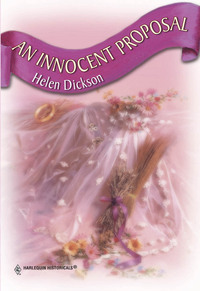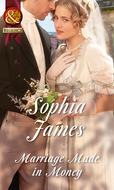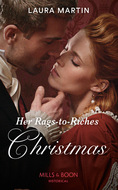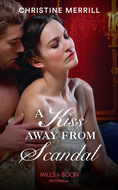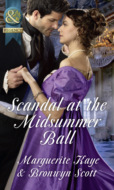Kitap dosya olarak indirilemez ancak uygulamamız üzerinden veya online olarak web sitemizden okunabilir.
Kitabı oku: «An Innocent Proposal»
“Let us cut the preliminaries, shall we?
“I find you extremely attractive and it is obvious we were made to know each other better—that our paths were destined to cross. Should Mr. Fraser find he has another engagement tomorrow night, you could accompany Mr. Hacket to Dunstan House or come by yourself. You will be well received and find it extremely rewarding.”
Even though Louisa had spent all her life buried in the country, away from the sleaze and corruption of London, she would have had to be a simple, naive fool not to have known the implication of his words. Insulted, hot, angry color flooded her cheeks again and she took a step back abruptly, gazing at him with pure loathing.
“I think you are mistaken, Lord Dunstan. I am not for sale.”
An Innocent Proposal
Helen Dickson
MILLS & BOON
Before you start reading, why not sign up?
Thank you for downloading this Mills & Boon book. If you want to hear about exclusive discounts, special offers and competitions, sign up to our email newsletter today!
Or simply visit
Mills & Boon emails are completely free to receive and you can unsubscribe at any time via the link in any email we send you.
HELEN DICKSON
was born and still lives in south Yorkshire with her husband, on a busy arable farm where she combines writing with keeping a chaotic farmhouse. An incurable romantic, she writes for pleasure, owing much of her inspiration to the beauty of the countryside. She enjoys reading and music. History has always captivated her, and she likes to travel and visit ancient buildings.
Contents
Chapter One
Chapter Two
Chapter Three
Chapter Four
Chapter Five
Chapter Six
Chapter Seven
Chapter Eight
Chapter Nine
Chapter Ten
Chapter Eleven
Chapter Twelve
Chapter Thirteen
Chapter Fourteen
Chapter Fifteen
Chapter One
1756
It was the golden blaze of her hair and the wonderful sound of her laughter that first drew Alistair’s gaze to Louisa. He was as quick as any other man to look at a beautiful woman.
She was at the centre of a group of boisterous young bucks who, if their loud and coarse laughter was anything to go by, had drunk too much wine than was good for them. Several he recognised, two of them being James Fraser and Timothy Hacket. They appeared to have an enormous capacity for enjoying themselves as they partook of an evening of music and dancing at the Spring Pleasure Gardens at Vauxhall on the Thames at Lambeth.
It was a place of informality, where extravagance and pleasure were fashionable. Vauxhall had long since been established as one of London’s favourite resorts; its covered walks and dark paths leading from lamp-lit alleyways, with so many intricate twists and turns that even the most experienced could get lost, made it an ideal place for flirtation, assignation and intrigue, where ladies of the town loitered in the shade and many a stolen kiss was to be had.
Following a long and tedious debate on foreign policy in the House of Lords, and feeling replete and in a strangely mellow mood after a good meal and a glass or two of fine brandy, Alistair had left the supper box where he was dining with friends to listen to the strains of the orchestra, and to watch idly the crowds that always flocked to Vauxhall. Pavilions of entertainment shone brightly amidst illuminated trees, and he stood close to one where country dancing was being enjoyed by a good many of the younger people.
The June air was cool after the day’s heat, and the gardens were a popular site for summer pleasure, a place of respectability and intrigue, where people from all walks of life could combine. Everyone was there—double-chinned, bewigged politicians, lauded writers, artists, actresses, courtesans—all resplendent in shimmering silks and satins, the women’s dresses cut low to reveal smooth, bare shoulders. The gardens were illuminated with lighted lamps, beneath which the people strolled, chatting and laughing, with expectancy on their faces as they thought of the good food, good wine and pleasant music to be listened to and enjoyed.
That was when the young lady first caught Alistair’s eye. With a good deal of pleasure he allowed his gaze to dwell on her, noticing that she seemed to be endowed with a boldness second to none as he witnessed the effect her intense personal charm had on those around her. It lurked in her playful eyes, in the tilt of her head, and in her soft seductive smile, which she seemed to use on any of the gentlemen who gave her the opportunity.
Thinking of her with a good deal of curiosity and interest, he hardly noticed when Lady Bricknell, having noticed his absence from their supper box, came to stand beside him, following his gaze and smiling when she detected the source of his interest. Lady Bricknell was wise in many ways, and recognised something in Alistair’s expression she hadn’t seen in a long time.
His gaze was warm as he looked at the young woman, and at the same time ablaze with a passionate awareness. She could see his interest and curiosity, which broadened the smile on her lips, for it was a rarity indeed to see Alistair Dunstan—self-proclaimed single man from bitter experience, who regarded all women as being dispensable and irrelevant—look at a woman as he was doing now.
“So, the young lady has taken your fancy, I see, Alistair,” she murmured. “You always did have an eye for a pretty girl, but I think you will find that that particular young lady may be spoken for.”
With a great deal of reluctance Alistair managed to drag his gaze away from the object of his interest and smile down at Lady Bricknell. She was a strong and vibrant woman, five years older than his own thirty years. A strange friendship existed between them, having first become acquainted when she had married his good friend Lord Bricknell, a man of his own age. She was the illegitimate daughter of a countess and had been most cruelly persecuted by her family because of it all her life, until she had caught the eye of Lord Bricknell who, unable to resist such a wild and fascinating creature, a lady who lived by her wits, had married her. Her family had hoped marriage would curb her wilful ways, but it was not to be. Lord Bricknell had died five years into their marriage, leaving her an extremely wealthy woman.
“I wonder who she can be?” Alistair said, looking at the young woman once more, and seeing her give one of the gentlemen an impish glance with sparkling eyes. Her merriment was spontaneous, her laughter, which sounded like the sweetest tones of a bell, full of delight. “I do not recall having seen her before.”
“She’s certainly very pretty, popular too, it would seem, and because she shows no restraint—unlike young ladies of good family and breeding—I would say she has no silken chains to bind her to her parents, which puts her on a different plane to your own.”
“And why do you say that?”
“Owing to the fact that she is alone in the company of a group of idle, pleasure-seeking young gentlemen, with no care for etiquette or polite society. It tells me she is an ordinary girl—an actress, possibly—and from the way she is behaving I would say she is Fraser’s mistress, or would very much like to be.”
“She is no ordinary young lady.”
“Not in your eyes, perhaps,” Lady Bricknell chuckled, “but the familiarity she shows to both Mr Fraser and Mr Hacket tells me she is no innocent. I must ask them to bring her to one of my soirées some time. You must remind me.”
Alistair smiled as she moved on to speak to an acquaintance she saw in the crowd, while his bold, admiring stare seldom abandoned the young lady’s perfect face and figure. The air was full of laughter and conversation, and he watched as James Fraser playfully placed a gardenia in her hair, and by way of thanks she placed a kiss upon his cheek, before being whisked into a lively dance by young Hacket, his hand firmly placed on her hand-span waist, her feet gliding effortlessly in step to his; like a butterfly her body dipped and swayed to the rhythm of the music to reveal the tips of her dainty satin shoes, the flounces and ruffles of her violet-blue gown billowing about her.
Intrigued, Alistair watched her to the point where everything else became a blur around him, as she twirled and spun, completely unselfconscious and unaware of the effect she was having on him. He saw the languor in her eyes as she gazed up at her partner, her lips parted in a smile, but then she seemed to sense Alistair’s eyes on her and turned her head, calmly and irresistibly drawn to his gaze.
And then all too soon it was time for the group to leave, and on the arm of James Fraser she passed close to where Alistair stood, so close that he caught the amorous perfume of the gardenia young Fraser had placed in her hair. He saw that her eyes were filled with joyful laughter, her face aglow and her lips curving gently, her expression marked by so much pleasure that he could have had no indication of the anxiety and unhappiness that marred her life.
As their carriage travelled over the recently constructed Westminster Bridge, taking Louisa, her brother James and their friend Timothy Hacket home from Vauxhall, Timothy took hold of Louisa’s hand and squeezed it affectionately.
“Have you enjoyed yourself, Louisa?” he asked, thinking how lovely she looked with her eyes still shining from the excitement of the evening, knowing that, unlike James, there were few pleasures in her life.
“Enormously,” she replied in truth, for she could not remember when she had been fêted by James so well. His suggestion that he give her a surprise birthday treat had offered her a brief respite from all the troubles that beset her life, and to forget, if just for a little while, the purpose of her visit to London.
Dreamily, Louisa found her thoughts dwelling on the gentleman who had been standing alone on the edge of the dancers, staring at her in a cool, impertinent way. She recalled the impact of his gaze across the space that had divided them, of those intense, vivid blue eyes. His look had been bold, bolder than was customary, and experiencing a feeling of feminine pleasure that she had attracted the attention of such a handsome man she had found herself looking back for a moment and smiling softly. She remembered how she had felt her limbs shiver like an aspen when his smile had broadened, before Timothy had swept her away in another dance.
She had arrived from her home in Surrey that very day. It was her twentieth birthday, but, her parents both dead, she had long since learned not to expect any form of good wishes or celebration from her brother, who was wrapped up in his own self-indulgent world of gambling and enjoyment. The purpose of her visit was to confront James, to beg him, as she had done countless times in the past, to give up his reckless, expensive way of life and return to live in Surrey, for if he did not heed their situation, then ruination would very soon be knocking on their door.
When she had broached the subject on her arrival, James was at once on the defensive and had become angry, finding her persistence to try to reform him extremely irritating. London, with its splendour and corruption, its squalor and excitement, thrilled and entertained him in a way his provincial home in Surrey had never done. His taste for pleasure and his capacity for enjoyment lifted his spirits in the restless, teeming city.
“Don’t make a fuss, Louisa,” he’d admonished, frowning crossly, uncharacteristically thinking of a way he could silence her on the subject—if only temporarily. “Today is your birthday and it’s not often I have the opportunity to be nice to you, so now you are here I shall give you a birthday treat.”
With that Louisa had concurred, and she’d allowed herself to be fêted and spoiled when he and Timothy had taken her to the Vauxhall Gardens, where they had met up with a group of their acquaintances. Finding herself unexpectedly surrounded by so much beauty and gaiety, and overwhelmed by the sense of occasion and James’s solicitude, it had been impossible for her not to enjoy herself, which she had done, enormously, managing to put her troubles behind her for a while. But on reaching Henrietta Street where James lived, and being told he was to go on to his club, she at once protested and they argued bitterly, at which point James stormed out of the house, an apologetic-looking Timothy following in his wake.
Her wonderful evening in ruins, and the gentleman who had admired her so openly forgotten, there was nothing for it but for Louisa to retire to bed, where she wept copious tears of bitterness and frustration, her inability to penetrate her brother’s stubbornness in his determination to carry on digging them deeper and deeper into the mire plunging her into the depths of despair.
Attending Sunday morning matins the following day at St Paul’s church in Covent Garden—as he often did when he was in London, which was mercifully cool after the intense heat outside—Lord Alistair Dunstan sat in the full congregation, hearing the priest in his ornate robes intone solemn, centuries-old words. It would be some time before he would be able to leave for Huntswood, his home in Sussex, his prime interest in life being his estate and his dependants. But he did his Parliamentary duty by being a regular attender at Westminster and taking his seat in the House of Lords—especially at this time with the outbreak of war, in which Great Britain and Prussia, under Frederick II, were allied against France and Austria.
The main cause of the war was the rivalry of Prussia and Austria in Germany, but from the British point of view the main interest lay in the rivalry of Britain and France, mainly in India and in Canada and at sea.
Letting his attention wander as the priest turned to the altar, Alistair’s gaze rested on a young woman in a pew opposite. Remote and slender, she had a purity of profile which arrested and compelled his eyes, and into his mind came a sudden recollection—a face he had seen at Vauxhall the previous evening—of the young woman who had captured all his attention.
Her devotions as she knelt and prayed seemed absolute. Her golden hair was haloed in the light penetrating the windows, and he saw, when she lifted her head and let her gaze fall on the cross on the altar, that her expression of rapturous, holy adoration was like a medieval icon. Along with the rest of the congregation he knelt, automatically saying the familiar words of the prayer, but his gaze kept straying to the young woman across from him, on the gracefulness of her head, now bent in utter submission, her lips moving in silent prayer.
As if aware of his eyes on her, suddenly she raised her head and shot a glance at him, her eyes hot and amber, and intensely secretive in the atmosphere of reverence, a flickering of recognition stirring in their depths. The sheer desperation of that glance, the nakedness of it, and the intimacy, made Alistair feel that they were the only two people inside the church.
Then the service was over and he stood, momentarily distracted by the people moving all around him. The priest, recognising him, paused to exchange a few words, and when he looked again for the young woman she had disappeared outside into the blazing sunlight. He, too, left and he could still feel the imprint of the woman’s secretive glance. He had been made uneasy by it. There was something different about her, something that reached out and touched him in half-forgotten obscure places.
Two months later, breathing in the sharp mysteries of the night, Louisa hurried through the dark London streets, knowing her parents would turn in their graves if they knew the dangers their only daughter was placing herself in. But her brother James’s carriage was unavailable, as he’d taken it himself, and she’d shelved the idea of ordering a hackney or a chair to take her the short distance from the small house he rented in Henrietta Street to Lady Bricknell’s magnificent residence on the Strand, deciding to walk instead.
One of London’s most popular socialites, Lady Bricknell was throwing one of her notorious parties, to which, according to Alice, the only servant James could afford to employ, James and his good friend Timothy Hacket had been invited.
Louisa reminded herself that the streets held all kinds of dangers and terrors, where young women alone were easy prey for all kinds of villains with evil intent, especially after dark when no one was safe, but such was her anxiety to find her brother that she would have braved Hades itself—the underworld abode of dead souls—that night.
With her heart thumping in her breast, she drew her cloak about her and averted her eyes from the shadows which stirred and shifted down dark alleyways. She heard a cry—human or animal she knew not which, but it was probably a cat foraging for food. Thankfully several people were abroad along the Strand and no murderer or rapist leapt out at her. The only light came from the lamps hanging above the front gates of the larger houses, and glass globes half filled with whale oil, which were fixed to posts at regular intervals or suspended from poles sticking out from the walls on either side of the street, but most of them were so black with dirt that they cast a mean light. It was with immense relief that at last she saw the lights of Bricknell House ahead.
Hearing the sounds of music and laughter coming from within, Louisa paused at the bottom of the steps, reluctant to enter what she considered to be a house of ill repute, despite the distinction of its owner, who was rumoured to be a beautiful, very merry widow, whose husband had left her immensely rich, enabling her to pursue a passion for high living. Her parties were infamous, where gentlemen of breeding and rank, having ingratiated themselves with her to procure an invite, were entertained, and where no respectable lady would be seen dead.
The women who attended these parties were common actresses and courtesans—ladies of pleasure—and the moment Louisa stepped through the door at the top of the steps everyone would assume she was one of them. As a well-bred innocent from the country, how far removed that was from the truth, but for James’s sake she must be careful to give no one reason to suspect she was anything else.
Drawing a long, steadying breath, she nervously climbed the steps towards the double doors, knowing she had a part to play if she was to be admitted in order to see James, and that to avoid him any embarrassment she must not let it be known that she was his sister, come to persuade him to return home like a naughty boy—before he lost everything they owned at the gaming tables.
Assuming an air of confidence and superiority when a young footman apprehended her in the doorway, politely requesting her name so that she might be announced, she laughed forcibly, removing her cloak and handing it to him. Shaking loose her wonderful mane of strawberry-blonde hair which had become flattened beneath the hood, and in a casual manner that surprised even herself, she leaned towards him.
“I am expected,” she said, a quiet, conspiratorial smile playing on her lips as she gave him a provocative glance from under her thick black eyelashes which made him immediately her willing accomplice. “It is my wish to surprise a certain gentleman, you understand?”
The footman understood perfectly and nodded, thinking her a pretty wench. Her attire was somewhat plain in comparison to the flamboyant painted doxies who usually attended Lady Bricknell’s parties, but she did look quite stunning in a gown the colour of a newly opened, moist magnolia, which set off her creamy skin to perfection.
Louisa suddenly found herself in a glittering house full of colourful peacocks, and she was startled when the proudest, most arrogant peacock of them all suddenly appeared by her side, having followed her up from the street and seen her hesitate in the doorway. Wearing a short wig of exquisite whiteness, he was tall, dressed in a violet-coloured frock suit of heavily embroidered silk; a fine lacy jabot spilled from his throat in a frothy cascade and lace ruffles dripped over his wrists and over well-shaped hands, caressing his elegant, bejewelled fingers. He was attractive, with sultry features and dangerously hooded eyes, and he exuded all the confidence of a conceited charmer.
“Now, who can you be?” he enquired with unconcealed curiosity, his voice as smooth and seductive as the softest silk, his eyes absorbing every detail of her face and figure. “I cannot say that I’ve seen you at any of the soirées I have attended before. However, I cannot leave such a lovely lady floundering in the doorway. Please allow me to escort you inside. Come, take my arm. I am eager to see the effect your appearance will have on the other ladies present. I have no doubt you will ruffle a few feathers and cause quite a stir.”
Unable to resist such charming flattery, especially when it was spoken by a man whose eyes twinkled with such wicked mischief, Louisa responded with a smile and laid her hand on his arm, which was offered in such a way that it was a masterpiece of gracious arrogance.
“Is it because of my looks and because I am a stranger that I will cause a stir—or because I am with you, sir?” she murmured with an impudent smile and a delicate, knowing lift to her brows.
He laughed outright, showing teeth as white and strong as those of a wild animal. “You read me too well, dear lady—my reputation has gone before me,” he said, his heavy lids drooping over his eyes suggesting at intimacy, and a salacious, lazy smile curling his full lips. “It is not merely a stir I would like to cause with you, but an outright scandal.”
“I suspect a scandal would not concern you, sir—only the making of one,” Louisa replied coolly, forming her own judgement of him and sensing he was of an unpredictable, dangerous nature, of which her instinct told her to beware.
Seeing the smile fade from her lips and a wariness enter her eyes, her companion chuckled under his breath as they moved into the room. The spontaneous smile he bestowed on the women he passed had the desired effect, for their lips twitched and melted into smiles, which they hid behind fluttering fans that spoke a language all of their own.
“Come, now, do not pretend to be shocked,” he murmured. “I am sure—looking as you do—that you must be quite used to such flattery. You mustn’t mind my flirting with you. Most women who attend these parties expect it and are mortally offended if they find themselves ignored.”
“Really? You astonish me,” Louisa replied, with a delicate lift to her eyebrows.
“And don’t worry. I haven’t been invited either, but I do not think Lady Bricknell will have either of us thrown out. She is far too obliging to do that,” he confided. Earlier he had been undecided whether to go to a regular gambling haunt of his on the south side of the river or pay a visit to Bricknell House, knowing Lady Bricknell was holding one of her famous parties. Casting an appreciative, predatory eye over the young woman by his side, he was glad he had chosen the latter.
“I’m glad to hear it,” said Louisa.
“Tell me, who is it you are looking for? I overheard you telling the footman that you were here to surprise a certain gentleman. Who is the fortunate fellow?”
“James Fraser.”
At the mention of the name his eyes opened wide with surprise. “Good Lord! I had no idea James could spare time away from the tables to become amorously involved with anyone.”
Louisa winced, although she tried not to show how deeply wounding his words were to her, reminding her so brutally of her brother’s shortcomings. “Are you a friend of his?” she asked, trusting this was not the case, as she suddenly found she had small liking for this particular gentleman, despite his geniality, and hoped that James was more selective in his friends.
“Shall we say I am an acquaintance?” he answered, drawing her into the crowded room.
Louisa stared around in fascination, feeling as if she had suddenly stepped into a dangerous, unrecognisable world, never having seen anything quite so bizarre as what she now saw. At any other time she would have been impressed by the sumptuous surroundings, had her whole being not been concentrated on finding her brother.
Quietly and firmly she excused herself to her companion and moved away, not wishing to draw undue attention to herself—which was no easy matter for she was exquisitely attractive, a figure of elegance, one who instinctively drew a second, lingering glance. There was not a thing she could do about it, for it was innate in her—like drawing breath. She was unaware that in her plain gown, with no ornamentation other than a fine lace edging around the modestly cut neckline, she was scintillating, and was far more alluring than if she had been adorned from head to toe in jewels.
Unaware of the continued attention of her escort as his eyes followed her with a determined, interested gleam, she mingled with the crowd of people, taking a proffered glass of champagne from a silver tray being carried among the guests by a splendidly attired footman. She had no liking for liquor of any kind and did not intend to drink it, but knew she would be less likely to draw attention to herself with a glass in her hand and looking as though she was enjoying herself.
As she moved among the people gathered in groups, some standing, others lounging indolently on gilt sofas and chairs, and with every face flushed to all shades of crimson, she tried not to appear shocked at finding herself in such a place, deliberately not looking too closely at what was going on. But while the moralist in her disapproved of this kind of behaviour her rebellious Bohemian instinct secretly admired it.
The room was hot, crowded and noisy. The men were dressed in elegant frock coats, and some wore powdered wigs, and their cravats were becoming limp and their clothes soiled with food and drink.
But the men were outshone by the ladies, who were painted and powdered saucy creatures—a languid bevy of scented, fan-waving beauties of the demi-monde—with not very respectable origins, but holding great fascination. They hung onto the gentlemen’s arms, and were devoured by them with hungry eyes as they flaunted and flirted with them outrageously. They were dressed in gaudy, disgracefully low-cut gowns, and were drunk on champagne and behaving in a manner which Louisa could not pretend to, making her blush and look away. No doubt they would become more loud and vulgar as the night wore on, she thought.
Managing to avoid the groping hands of some of the gentlemen who reached out as she passed, and ignoring their lewd suggestions and exaggerated winks, she was beginning to wish she had not come. But then she remembered the purpose of her being there, of Bierlow Hall, her wonderful home in Surrey, impoverished though it was, and that James, being a man of expensive tastes, in his reckless desperation to improve their lot, was in danger of gambling it all away. She had come to London two months ago to beg him to abandon his dissolute way of life and return with her to Bierlow. He had done so, but he had not stayed much longer than four weeks before he had become bored and returned to London.
Louisa’s resolve to find him before it was too late sent her towards a room where several card tables had been set up, knowing she would find her brother there.
Here the noise was curiously muted so as not to distract the players. Small tables for dice, whist, French hazard and other games that took the guests’ fancy had been set up. Louisa’s eyes scanned the groups of people clustered around them, where several games were in progress. The players were obscured from view but on seeing the tall figure of Timothy Hacket standing in a small group she moved towards him.
Timothy turned when he felt her press herself against him, his face registering shocked surprise when he recognised her. He immediately took her arm and drew her away, but not before she had seen her brother sitting at the table, his body taut, and a wild, concentrated gleam in his eyes which only gamblers had when, intent on winning, they saw nothing except the cards in front of them.
“Good Lord, Louisa! What are you doing here? I thought James had left you at Bierlow?”
“He did, but after he left for London four weeks ago…I discovered just the other day that the only valuables remaining in the house had disappeared, and I knew James must have taken them, and exactly what he intended doing with them—that he would sell them in order to pay for his gambling. I had to come.”
“He will be outraged if he sees you—here of all places. It is hardly the kind of establishment where he would care to see his sister.”
“I do not care, Timothy. I am well aware that if I had a place in society I would be disgraced for all time—but with so much at stake the ethics of the matter do not concern me. Our situation is desperate, you know that. James must be made to stop before it is too late and we have nothing left to sell or gamble but the estate—such as it is.”
“I know that, but he is determined. He will not be stopped.”
“Have you tried?”
“Yes, but you know what James is like when he has his head set. He will not listen.”

